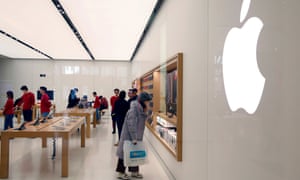Will Hutton
 Our mental geography is bounded by what has gone before. What has happened in the recently remembered past is most likely to continue. Inflection points, when trends decisively change, are more infrequent than the many instances when things go on as they have done.
Our mental geography is bounded by what has gone before. What has happened in the recently remembered past is most likely to continue. Inflection points, when trends decisively change, are more infrequent than the many instances when things go on as they have done.
Two of today’s trends seem unstoppable. China’s astounding growth will continue, so the story runs, underwriting its arrival as the second economic superpower. To get a share in that China action, underpinning the entire growth of Asia, is one of the prime economic arguments for Brexit. Abandon sclerotic Europe, embrace the prosperity of Asia – even if it is a world of semi-democracy at best, authoritarian government at worst. It can be guaranteed to grow.
Second, the west coast big tech companies, from Facebook to Apple, are the new wonders of the universe. They are the bewilderingly successful face of the informational, data-driven economy whose value continues to soar. Apple, then Amazon, became the first trillion-dollar corporations last year, both exemplars of how first movers in innovation with their transformative technologies have become 21st-century titans, driving stock market growth and changing society alike.
However, last week, both trends were decisively challenged in what looks like a world-changing inflection moment, one where consensus assumptions start to unravel. Apple announced that for the first time in 17 years it would not meet its forecasts for revenue growth – and by a big margin. Its CEO, Tim Cook, explained to investors and staff that apart from the problems facing all makers of mobile phones – it is becoming a mature market – there was unexpected sales weakness in China. This was not just down to intense competition, but because China’s consumers were spending much less. Apple’s share price plunged – cumulatively, its value has fallen by a stunning $400bn in a couple of months.
China’s total debt, even on distrusted official figures, is approaching three times its GDP
But surely China, landing its robotic satellite on the far side of the moon, is suffering no more than a typical cyclical setback, intensified by Donald Trump’s trade war? Perhaps, but look more closely and it is ever clearer that long-standing problems are starting to envelop this continental economy.
It was only eight years ago that China registered 12% growth as the government turbo-boosted its economy with a massive stimulus in the wake of the financial crisis, growth that staved off a world slump. But since then its official growth rate has been consistently sliding, now halved at 6%, and China’s consumers have started to notice what last year’s 25% fall in China’s stock market is also signalling. Alongside Apple’s statement, last week’s surveys showing China’s famed manufacturing sector is set to decline in 2019 and further weakness in retail sales were more evidence that all is not well. China’s consumers are reading the runes.

Guardian Today: the headlines, the analysis, the debate - sent direct to you
Part of the issue for both Apple and China is the law of large numbers. Three-fifths of Apple’s sales are iPhones and there just aren’t enough global consumers with pockets deep enough to keep up the growth momentum. China’s issues are even more profound. There comes a limit, even in a state-controlled economy, to manipulating growth through debt and exports when the numbers reach astronomic levels. China’s total debt, even on distrusted official figures, is approaching three times its GDP, a flashpoint ratio for every economy when bank balance sheets, and their borrowers, just become too overstretched.
This was the trigger for Japan’s economic depression 30 years ago. Moreover, if China’s exports carried on growing as fast as they had, they would crowd out every other export from every country in the world by the mid-2020s. This was never likely, economically or politically. If Trump had not launched his trade offensive, another US leader would have done so. Apple and China, bluntly, are in a fix.
The Chinese Communist party is in a gathering crisis of legitimacy. If the growth rate sinks below 6% (unofficial figures now place growth at under 2% in 2018), its job-generating capacity starts to falter and questions will be asked about the competence of the party. Past leaders have responded to crises by intensifying the pace of transition towards a capitalist economy and boosting infrastructure spending as a quick fix.
These are not options for Xi Jinping. So high has infrastructure spending been for so long that the financial returns to justify further debt are nonexistent. Nor can he free the economy further without endangering the party’s control. His options are a combination of hoping hi-tech, driven by extravagant R&D spending, will offer a stronger economy (along with more repression as a safety fallback and finding enemies around which the country can unite).
The speech last week warning China might go to war to end Taiwan’s independence was the most bellicose of any Chinese leader since Mao. Be in no doubt – if economic difficulties worsen, Xi may be compelled to rally his restive population around a limited conflict just to stay in power.
In a mirror image, Apple is spending as aggressively on R&D as China, hoping that will solve its problems too. Apple is indubitably innovative and the scale of its research should throw up new products; it is already developing a great service business. For China, the message is even starker. A one-party state can’t risk any bumps – and there are more than bumps ahead. Nothing, not even the wondrous success of the iPhone, lasts for ever. And that is especially true for a dysfunctional Chinese economy, and the party that runs it.
As 2019 begins…
… we’re asking readers to make a new year contribution in support of The Guardian’s independent journalism.
Three years ago we set out to make The Guardian sustainable by deepening our relationship with our readers. The same technologies that connected us with a global audience had also shifted advertising revenues away from news publishers. We decided to seek an approach that would allow us to keep our journalism open and accessible to everyone, regardless of where they live or what they can afford.
More than one million readers have now supported our independent, investigative journalism through contributions, membership or subscriptions, which has played such an important part in helping The Guardian overcome a perilous financial situation globally. We want to thank you for all of your support. But we have to maintain and build on that support for every year to come.
Sustained support from our readers enables us to continue pursuing difficult stories in challenging times of political upheaval, when factual reporting has never been more critical. The Guardian is editorially independent – our journalism is free from commercial bias and not influenced by billionaire owners, politicians or shareholders. No one edits our editor. No one steers our opinion. This is important because it enables us to give a voice to those less heard, challenge the powerful and hold them to account. Readers’ support means we can continue bringing The Guardian’s independent journalism to the world.
No comments:
Post a Comment